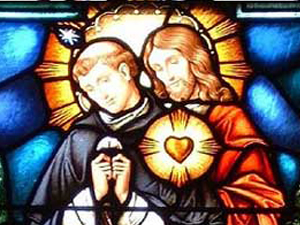 A very wise priest is fond of starting all his discussions on the sacraments with the following fundamental truth. When teaching on the sacraments, we must remember that nobody encounters God without being fundamentally changed. In the Old Testament the names of individuals were changed. Moses’ face became as bright as the sun, and Elijah & Elisha undertook missions that changed their lives (and the lives of all history) forever after encountering the divine. In the New Testament, prostitutes were pardoned, the blind saw, the lame walked, and sinners dropped everything and followed Christ at only his command.
A very wise priest is fond of starting all his discussions on the sacraments with the following fundamental truth. When teaching on the sacraments, we must remember that nobody encounters God without being fundamentally changed. In the Old Testament the names of individuals were changed. Moses’ face became as bright as the sun, and Elijah & Elisha undertook missions that changed their lives (and the lives of all history) forever after encountering the divine. In the New Testament, prostitutes were pardoned, the blind saw, the lame walked, and sinners dropped everything and followed Christ at only his command.
What does this truth tell us about the Sacrament of Baptism? While all sacraments do indeed change us, baptism is one of three sacraments where the change is special indeed. Along with the sacraments of Matrimony and Holy Orders, baptism fundamentally changes the nature of the Christian. Paragraph 1241 of the Catechism of the Catholic Church tells us that in baptism, we are anointed priest, prophet, and King.
Another way to understand this is that as we are conformed to Christ, we share in the authority of Christ to a greater and greater degree. Christ’s priesthood manifests itself in two different fashions today. We see the ordained priesthood and the priesthood of all believers.
The ordained priesthood is the one most Catholics are familiar with. When the Christian is ordained a priest in the order of Melchizedek, he shares in the authority of Christ’s priesthood in regards to offering the Sacrifice of the Mass, providing the sacraments, and sharing in the governance of the Church on a spiritual and juridical level. Yet there is another way in which Christ’s priesthood is expressed.
While the concept of a priesthood of all believers has been frequently misunderstood, we should never deny its very ancient patrimony. (Exodus 19:6, 1 Peter 2:5) When the people of God are described in Scripture, priestly is a connotation that always describes them. While an ordinary layman cannot change bread into the Body of Christ or forgive sins in the confessional, how do we share in Christ’s priesthood?
A very simple way we do so is through the power of bestowing a blessing. When you end a conversation with “God Bless” you are performing a priestly act. We are imploring God on behalf of another for his favor. In the case of parents, they can actually bestow God’s favor upon their children, such as when Jacob blesses his children in the book of Genesis.
A second way we share in the priestly ministry of Christ is through the act of consecration. When you consecrate something, you take something ordinary, and dedicate it towards a holy purpose. A good example is St. Louis De Montfort’s Total Consecration to Mary, where we take our rather ordinary lives and dedicate them to the Heart of Mary, and therefore Christ. I can take the hands which type on this keyboard and consecrate them to the purpose of attempting to educate those who read this about the Sacraments. Our lives are overflowing with opportunities to consecrate the things of this world under our care to Christ, and if we cannot think of ten such opportunities on any given day, we are doing it wrong.
A final example of our priestly duties is that of sacrifice. While we cannot offer the Mass, we can offer ourselves. Indeed, the Bible commands us to do so. (Romans 12:1, 1 Peter 2:5) Through fasting and penance we can present our afflictions as a sacrifice for our own benefit and the benefit of others. (Job 1:5, Colossians 1:24) Finally, we can take all of these things and offer them alongside the Body of Christ in the Mass, as everything takes on a new significance when joined to the Holy Cross.
Why should we make such a big deal out of these seemingly insignificant things? We do them because Christ did them. Christ offered His blessing upon sinners like Zaccheus and Mary Magdalene. He took simple things like mud and used them to cure the blind. He took a small bit of food and offered it to the Father, and from that small offering thousands were fed. While it is highly unlikely that miracles will occur by our hands, the mere forgiveness of a prostitute turned a woman into one of Christ’s final followers. When looked at in that light, even the smallest of priestly acts should take on new significance.



